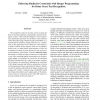499 search results - page 79 / 100 » Search Engines that Learn from Implicit Feedback |
WEBDB
2010
Springer
15 years 4 months ago
2010
Springer
The transition of search engine users’ intents has been studied for a long time. The knowledge of intent transition, once discovered, can yield a better understanding of how di�...
108
click to vote
CSE
2009
IEEE
15 years 5 months ago
2009
IEEE
—When the Internet was conceived, its fundamental operation was envisioned to be point-to-point communication allowing anybody to talk directly to anybody. With its increasing su...
89
Voted
CIKM
2010
Springer
14 years 9 months ago
2010
Springer
Individuals often use search engines to return to web pages they have previously visited. This behaviour, called refinding, accounts for about 38% of all queries. While researcher...
70
Voted
PROFES
2004
Springer
15 years 4 months ago
2004
Springer
One of the most prominent issues involved in incremental software development is to decide upon the most appropriate software release plans taking into account all explicit and imp...
105
click to vote
CVPR
2011
IEEE
14 years 7 months ago
2011
IEEE
The recognition of text in everyday scenes is made difficult by viewing conditions, unusual fonts, and lack of linguistic context. Most methods integrate a priori appearance info...


